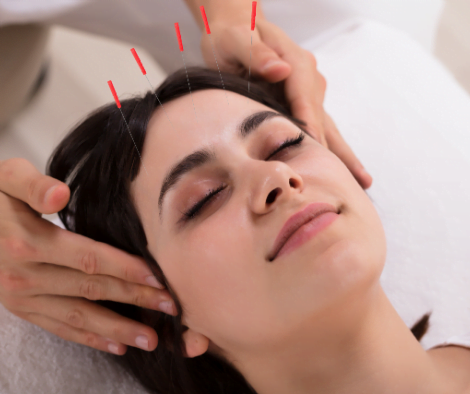Polycystic Ovary Syndrome (PCOS) is a common hormonal disorder affecting women of reproductive age. Characterized by irregular menstrual cycles, ovarian cysts, and hormonal imbalances, PCOS can lead to various complications such as infertility, weight gain, and increased risk of diabetes. While conventional treatments often include medication and lifestyle modifications, an alternative and holistic approach gaining popularity is acupuncture.
In this blog post, we will delve into the world of acupuncture for PCOS, exploring its potential benefits and how it complements traditional treatments.
Contents
Treating PCOS With Different Holistic Approaches

In addition to conventional medical treatments, many women are exploring holistic approaches to address the underlying causes and symptoms of PCOS.
Here are some of these:
Diet and Nutrition:
- Low-Glycemic Diet: Adopting a low-glycemic diet can help manage insulin resistance, a common issue in PCOS. This involves choosing complex carbohydrates over simple sugars, incorporating more fiber-rich foods, and focusing on whole grains.
- Anti-Inflammatory Foods: Including anti-inflammatory foods, such as fatty fish, leafy greens, and berries, can help reduce inflammation associated with PCOS.
Regular Exercise:
- Aerobic Exercise: Regular aerobic exercise can improve insulin sensitivity, aid in weight management, and regulate menstrual cycles. Activities like brisk walking, swimming, or cycling are beneficial.
- Strength Training: Building muscle through strength training can contribute to better metabolism and weight control, both important factors in managing PCOS.
Acupuncture:
- Acupuncture is an ancient Chinese practice that involves the insertion of thin needles into specific points on the body. It is believed to regulate the flow of energy (Qi) in the body and has shown promise in improving hormonal balance and regulating menstrual cycles.
What is Acupunture for PCOS?
Acupuncture is a traditional Chinese medicine (TCM) practice that involves the insertion of thin needles into specific points of the body. It is based on the concept that the body has a network of meridians, or pathways, through which vital energy, known as Qi, flows. When the flow of Qi is blocked or imbalanced, it is believed to lead to various health issues. Acupuncture aims to restore the balance and flow of Qi, promoting overall well-being.
In the context of PCOS (Polycystic Ovary Syndrome), acupuncture is used as a holistic approach to address the underlying imbalances and symptoms associated with the condition. PCOS is a hormonal disorder that affects women of reproductive age, characterized by irregular menstrual cycles, ovarian cysts, and elevated levels of androgens (male hormones).
Working on Acupunture for PCOS

It’s important to note that research in this area is ongoing, and the evidence supporting the efficacy of acupuncture for PCOS is still evolving.
Here are some proposed ways in which acupuncture may work for PCOS:
Regulating Hormones
- TCM Perspective: According to TCM, acupuncture helps balance the flow of Qi (vital energy) through the body’s meridians. This balance is thought to influence the body’s organ systems, including the endocrine system responsible for hormone production.
- Scientific Perspective: Some studies suggest that acupuncture may influence the release of certain hormones, including those related to reproductive function. For example, acupuncture may impact the regulation of gonadotropin-releasing hormone (GnRH), which plays a key role in the menstrual cycle.
Improving Insulin Sensitivity
- TCM Perspective: Acupuncture is believed to affect the body’s energy balance, potentially helping to regulate blood sugar levels and improve insulin sensitivity.
- Scientific Perspective: Insulin resistance is a common feature of PCOS, and some studies suggest that acupuncture may enhance insulin sensitivity. Improved insulin function can have positive effects on hormone regulation and ovarian function.
Reducing Inflammation
- TCM Perspective: Inflammation is often seen as an imbalance in the body’s energy flow. Acupuncture is thought to have anti-inflammatory effects, promoting a more harmonious state.
- Scientific Perspective: Chronic inflammation is associated with PCOS, and acupuncture has been shown to have anti-inflammatory effects. By reducing inflammation, acupuncture may contribute to improvements in symptoms.
Promoting Blood Flow
- TCM Perspective: Acupuncture is believed to enhance the flow of Qi and blood throughout the body. In the context of PCOS, this improved circulation is thought to benefit the ovaries and reproductive organs.
- Scientific Perspective: Studies have suggested that acupuncture may increase blood flow to specific areas, potentially improving ovarian function and follicular development.
Stress Reduction
- TCM Perspective: Stress is seen as a disruptor of Qi flow. Acupuncture is thought to have a calming effect on the nervous system, reducing stress and promoting relaxation.
- Scientific Perspective: Chronic stress can exacerbate PCOS symptoms. Acupuncture has been shown to modulate the activity of the sympathetic nervous system and reduce stress hormones like cortisol.
Benefits of Acupuncture for PCOS
While individual responses may vary, here are some potential benefits of acupuncture for PCOS, presented in simple points:
- Hormonal Balance Acupuncture may help regulate hormone levels, including insulin and sex hormones like estrogen and testosterone, which can be imbalanced in PCOS
- Inflammation Reduction: Some studies suggest that acupuncture may have anti-inflammatory effects, which could be beneficial in managing inflammation often associated with PCOS.
- Improved Quality of Life: Acupuncture may contribute to an overall improvement in the quality of life for individuals with PCOS by addressing symptoms such as pain, mood swings, and sleep disturbances.
- Natural and Non-Invasive: Acupuncture is a non-invasive and drug-free approach, making it an attractive option for women seeking complementary or alternative therapies for PCOS.
- Complementary to Western Medicine: Acupuncture can be used in conjunction with conventional medical treatments for PCOS, complementing medications and lifestyle changes to provide a more comprehensive approach.
Limitations of Acupuncture for PCOS

While some studies and anecdotal evidence suggest potential benefits of acupuncture for individuals with Polycystic Ovary Syndrome (PCOS), it’s also essential to consider the limitations of acupuncture as a treatment option. Here are some key limitations:
- Variable Efficacy: Responses to acupuncture can vary widely among individuals. While some may experience significant improvements, others may see little to no effect. The efficacy of acupuncture for PCOS is not guaranteed, and results are often influenced by factors. These are such as the individual’s overall health, lifestyle, and the specific characteristics of their PCOS.
- Limited Scientific Evidence: While there is some research indicating positive effects, the scientific evidence supporting acupuncture as a stand-alone treatment for PCOS is not yet robust. More high-quality, large-scale studies are needed to establish its efficacy conclusively.
- Not a Cure: Acupuncture should not be viewed as a cure for PCOS. It may help manage symptoms and improve overall well-being, but it may not address the root cause of the condition. PCOS is a complex hormonal disorder, and a comprehensive approach, including lifestyle changes and medical interventions, may be necessary.
- Time-Intensive: Acupuncture treatments typically require a series of sessions over an extended period. This time commitment may be challenging for individuals with busy schedules or those seeking quick results.
- Cost Considerations: Acupuncture can be expensive, especially if multiple sessions are needed. Insurance coverage for acupuncture may vary, and not everyone may have access to affordable acupuncture services.
- Dependence on Practitioner Skill: The effectiveness of acupuncture depends on the skill and experience of the practitioner. Finding a qualified and experienced acupuncturist is crucial for optimal results, but this may not be accessible or affordable for everyone.
Sources To Get Acupuncture for PCOS
While acupuncture is traditionally an in-person therapy, there are also online platforms that connect users with licensed acupuncturists who provide virtual consultations. Keep in mind that the effectiveness of virtual acupuncture may vary, and it’s essential to choose a reputable platform. Here are a few online providers that offer virtual acupuncture services:
- HerMantra: HerMantra is an online counseling platform that also offers virtual acupuncture services. They connect users with licensed acupuncturists who can provide personalized sessions.
- ZipDoctor: ZipDoctor is an online platform that offers virtual acupuncture services. Users can connect with licensed acupuncturists for remote consultations and treatment.
- Aime: Aime is an online wellness platform that provides virtual acupuncture sessions. Users can book appointments with licensed acupuncturists and receive personalized care from the comfort of their homes.
- Modern Acupuncture: Some acupuncture clinics, such as Modern Acupuncture, have started offering virtual consultations. They may guide acupressure techniques and lifestyle changes that complement traditional acupuncture.
- Traditional Chinese Medicine (TCM) Telehealth Platforms: Some TCM practitioners offer telehealth services, including virtual acupuncture consultations. These platforms may connect users with experienced practitioners who specialize in TCM and acupuncture.
When exploring online providers, it’s crucial to research the platform’s reputation, ensure that the acupuncturists are licensed, and read user reviews. Additionally, consider consulting with your primary healthcare provider before starting any virtual acupuncture sessions. This is to ensure they align with your overall PCOS management plan.
Is Acupuncture for PCOS Effective?
The effectiveness of acupuncture for Polycystic Ovary Syndrome (PCOS) is a subject of ongoing research and clinical debate. While some studies and anecdotal evidence suggest potential benefits, it’s important to note that the scientific evidence is not yet conclusive, and individual responses to acupuncture can vary.
Here are key points regarding the effectiveness of acupuncture for PCOS:
- Limited Scientific Evidence: While there is some research indicating the positive effects of acupuncture on PCOS symptoms, the overall body of evidence is not robust. More high-quality, well-designed studies are needed to establish the efficacy of acupuncture for PCOS conclusively.
- Hormonal Regulation: Acupuncture is believed to influence hormonal balance, including insulin and sex hormones. Some studies suggest that acupuncture may help regulate menstrual cycles and improve ovulation in women with PCOS.
- Individual Variability: Responses to acupuncture vary among individuals. While some may experience improvements in PCOS symptoms such as irregular periods, infertility, and hormonal imbalances, others may see little to no effect.
Conclusion
In conclusion, acupuncture presents itself as a potential complementary therapy for individuals managing Polycystic Ovary Syndrome (PCOS). While there is some evidence suggesting benefits such as hormonal balance, improved ovulation, and stress reduction, it is crucial to acknowledge the limitations of this traditional Chinese medicine practice. Variable efficacy, limited scientific evidence, and the need for a qualified practitioner are important considerations.
Individual responses to acupuncture can differ, and its effectiveness may vary. It is not a standalone cure for PCOS but rather a part of a holistic approach that may include conventional medical treatments, lifestyle modifications, and other interventions.
If you are facing PCOS-related issues, PCOS treatment at HerMantra can help. Book your free trial online Pcos treatment session now.


